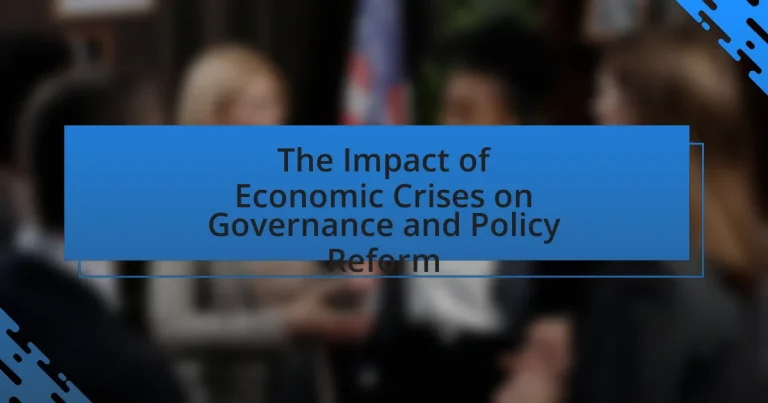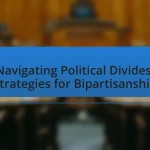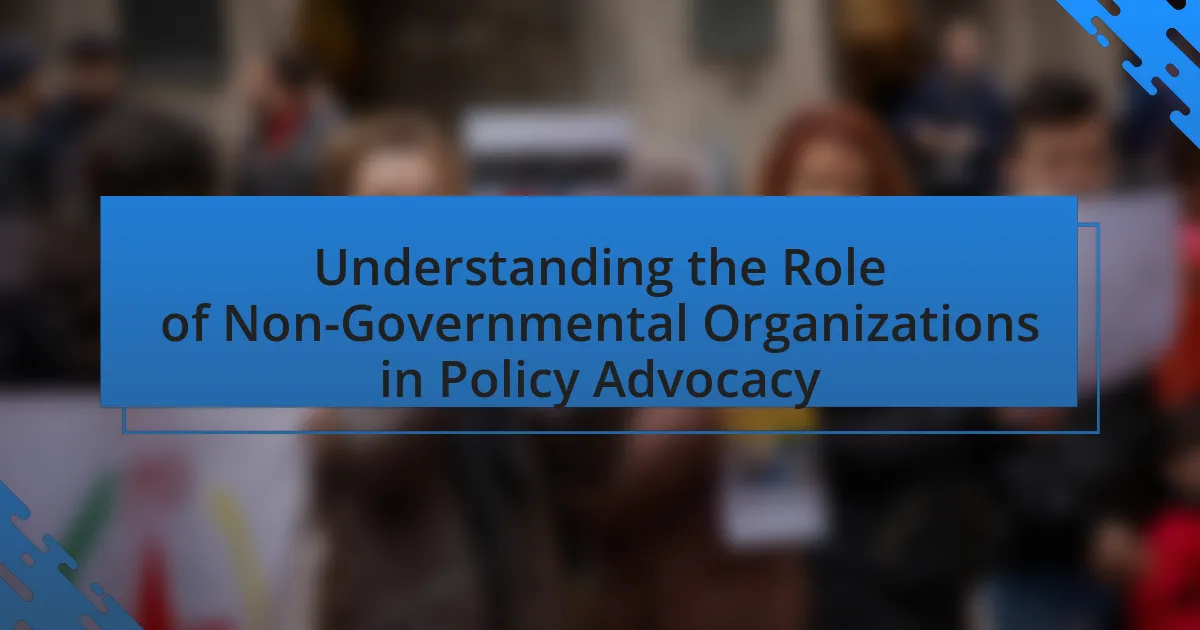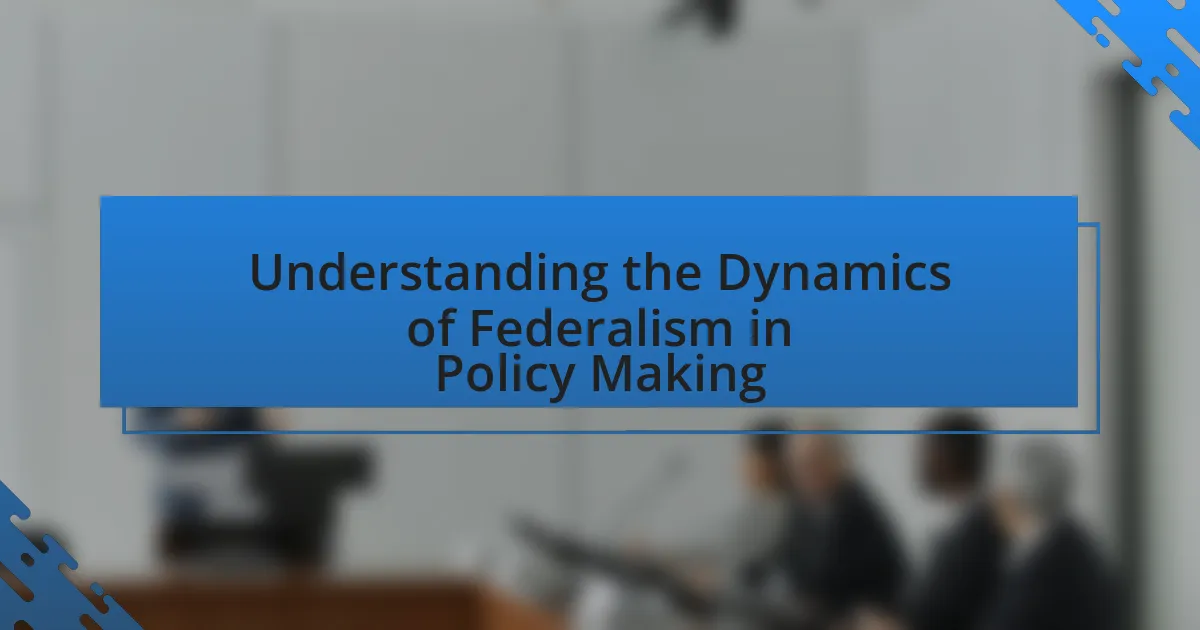The article examines the impact of economic crises on governance and policy reform, highlighting how such crises compel governments to reassess and restructure their policies to address immediate economic challenges. It discusses the influence of economic downturns on governance structures, leadership dynamics, public trust, and the urgency of policy changes. Key examples include the 2008 financial crisis and its aftermath, which prompted significant regulatory reforms and shifts in political power. The article also explores the long-term effects of crises on governance, the development of new governance models, and strategies for effective policy reform, emphasizing the importance of stakeholder engagement and adaptive governance in fostering resilience.
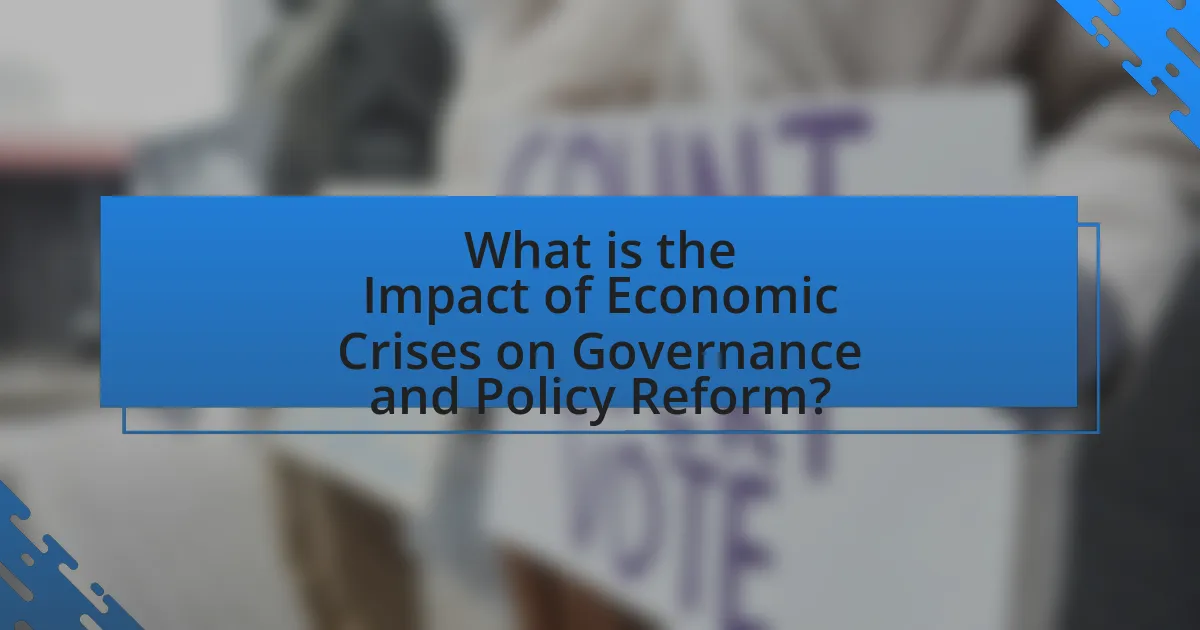
What is the Impact of Economic Crises on Governance and Policy Reform?
Economic crises significantly impact governance and policy reform by prompting governments to reassess and often restructure their policies to address immediate economic challenges. During crises, such as the 2008 financial meltdown, governments frequently implement austerity measures, regulatory reforms, and social safety nets to stabilize economies and restore public confidence. For instance, countries like Greece and Spain adopted extensive reforms in labor markets and public spending in response to their economic downturns, which were necessary to secure international financial assistance. These reforms can lead to both short-term stabilization and long-term changes in governance structures, as policymakers may prioritize efficiency and accountability in response to public demand for transparency and effective crisis management.
How do economic crises influence governance structures?
Economic crises significantly influence governance structures by prompting shifts in policy priorities and institutional frameworks. During such crises, governments often face increased pressure to implement rapid reforms, leading to a centralization of power as decision-makers seek to respond effectively to urgent economic challenges. For instance, the 2008 financial crisis resulted in many countries adopting austerity measures and restructuring financial regulations, which altered the balance of power between state institutions and the market. Additionally, economic downturns can lead to public discontent, prompting governments to either strengthen authoritarian measures to maintain control or enhance democratic processes to regain public trust. Historical examples, such as the economic reforms in Greece post-2010, illustrate how crises can reshape governance by necessitating external interventions from entities like the International Monetary Fund, thereby altering national sovereignty and governance dynamics.
What changes occur in leadership during economic crises?
Leadership during economic crises typically shifts towards more centralized decision-making and a focus on crisis management. During such times, leaders often prioritize immediate problem-solving and resource allocation to stabilize the economy, as seen in the 2008 financial crisis when governments worldwide implemented rapid fiscal stimulus measures. This shift is characterized by increased communication with stakeholders and the public to maintain trust and transparency, as demonstrated by leaders like Barack Obama, who emphasized clear messaging during the crisis. Additionally, leaders may adopt more adaptive strategies, reflecting a willingness to change policies quickly in response to evolving economic conditions, which was evident in the swift adjustments made by central banks globally to interest rates and monetary policy during economic downturns.
How do crises affect public trust in government?
Crises significantly diminish public trust in government. During economic downturns or crises, citizens often perceive government responses as inadequate or ineffective, leading to skepticism about leadership capabilities. For instance, a study by the Pew Research Center in 2020 found that 71% of Americans felt the government was doing a poor job handling the COVID-19 pandemic, reflecting a sharp decline in trust. Additionally, historical data shows that trust in government typically declines during economic recessions, as seen during the 2008 financial crisis when trust levels fell to historic lows, with only 20% of Americans expressing confidence in federal government performance. This correlation indicates that crises can erode the perceived legitimacy and effectiveness of government institutions, resulting in long-lasting impacts on public trust.
What role do economic crises play in shaping policy reforms?
Economic crises serve as catalysts for significant policy reforms by exposing systemic weaknesses and prompting governments to implement changes to stabilize economies. Historical examples illustrate this role; for instance, the 2008 financial crisis led to the Dodd-Frank Act in the United States, which aimed to increase financial regulation and prevent future crises. Similarly, the European debt crisis prompted countries like Greece to adopt austerity measures and structural reforms in exchange for financial assistance from the European Union. These instances demonstrate that economic crises often create urgency for reform, compelling policymakers to address vulnerabilities and enhance resilience in governance and economic structures.
What types of policy reforms are commonly implemented during crises?
During crises, governments commonly implement fiscal reforms, regulatory reforms, and social policy reforms. Fiscal reforms often include increased government spending to stimulate the economy and tax adjustments to enhance revenue. For instance, during the 2008 financial crisis, many countries enacted stimulus packages that involved significant public investment. Regulatory reforms typically focus on enhancing oversight and accountability in financial markets to prevent future crises, as seen in the Dodd-Frank Act in the United States. Social policy reforms may involve expanding social safety nets, such as unemployment benefits and food assistance programs, to support vulnerable populations during economic downturns, which was evident in various countries’ responses to the COVID-19 pandemic. These reforms are aimed at stabilizing the economy, protecting citizens, and ensuring long-term recovery.
How do economic conditions dictate the urgency of policy changes?
Economic conditions dictate the urgency of policy changes by creating immediate pressures that necessitate governmental responses to stabilize or stimulate the economy. For instance, during economic downturns, such as the 2008 financial crisis, governments often implement rapid policy reforms to address rising unemployment and declining consumer confidence. Historical data shows that countries experiencing severe recessions tend to enact fiscal stimulus measures, such as increased public spending or tax cuts, within months of economic indicators signaling distress. This correlation between economic indicators and policy urgency is evident in the swift actions taken by the U.S. government, which passed the American Recovery and Reinvestment Act in 2009 to counteract the recession’s effects. Thus, the severity of economic conditions directly influences the speed and nature of policy adaptations.
Why is understanding this impact crucial for future governance?
Understanding the impact of economic crises on governance is crucial for future governance because it informs policymakers about the vulnerabilities and resilience of political systems during times of economic stress. Economic crises often lead to shifts in public trust, necessitating reforms that address the root causes of instability. For instance, the 2008 financial crisis resulted in significant changes in regulatory frameworks and governance structures worldwide, highlighting the need for adaptive policies that can mitigate future risks. By analyzing these impacts, governments can develop strategies that enhance accountability, improve resource allocation, and foster social cohesion, ultimately leading to more effective governance in the face of future economic challenges.
What lessons can be learned from past economic crises?
Past economic crises reveal critical lessons about the importance of regulatory frameworks and proactive governance. For instance, the 2008 financial crisis highlighted the need for stringent oversight of financial institutions, as lax regulations contributed to systemic failures. Additionally, the Great Depression of the 1930s demonstrated that timely government intervention, such as the implementation of the New Deal, can mitigate the effects of economic downturns and stimulate recovery. These historical examples underscore the necessity for adaptive policy reforms that prioritize economic stability and resilience in the face of future crises.
How can governments prepare for future economic downturns?
Governments can prepare for future economic downturns by establishing robust fiscal policies and maintaining a reserve of financial resources. Effective fiscal policies include creating budget surpluses during economic booms, which can be utilized during downturns to stimulate the economy. For instance, countries like Germany have successfully implemented such strategies, resulting in a lower debt-to-GDP ratio and greater resilience during economic crises. Additionally, maintaining a financial reserve, as seen in Singapore’s Government Investment Corporation, allows for quick access to funds that can support economic recovery efforts. These proactive measures enhance a government’s ability to respond effectively to economic challenges.
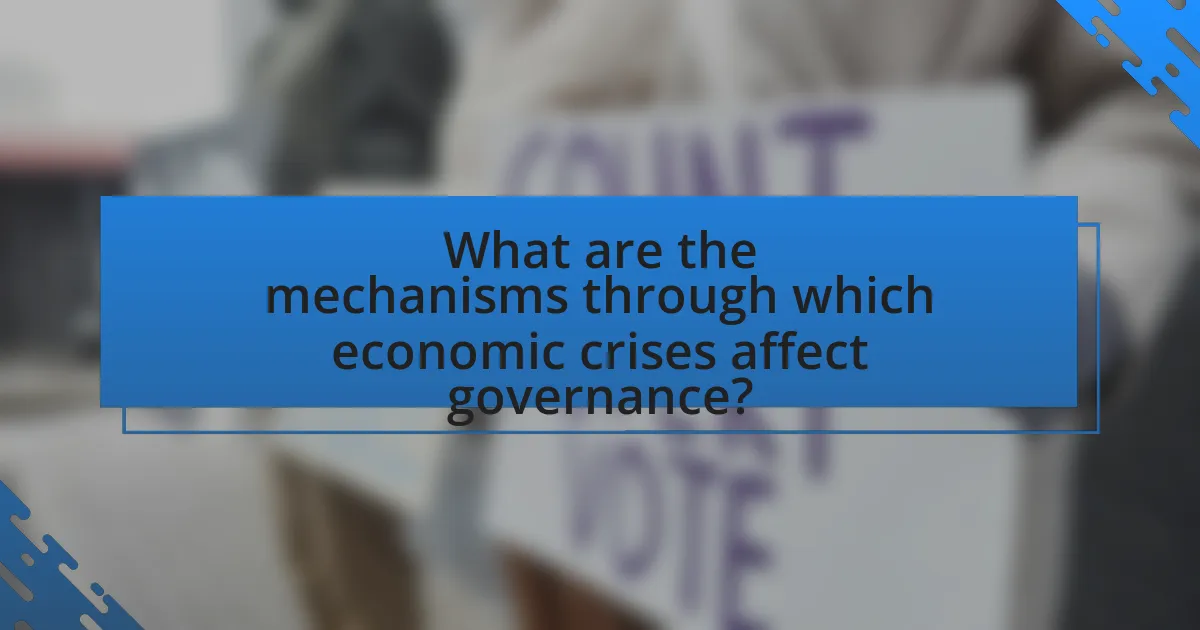
What are the mechanisms through which economic crises affect governance?
Economic crises affect governance through mechanisms such as increased public discontent, reduced government legitimacy, and shifts in policy priorities. During economic downturns, citizens often experience heightened dissatisfaction due to unemployment, inflation, and reduced public services, leading to protests and demands for accountability. For instance, the 2008 financial crisis resulted in widespread protests across Europe, reflecting a loss of trust in governmental institutions. Additionally, economic crises can diminish the legitimacy of governments as they struggle to manage the fallout, often resulting in political instability or changes in leadership. Furthermore, crises typically force governments to prioritize austerity measures or economic reforms, which can lead to significant shifts in policy direction, as seen in Greece during its debt crisis when drastic reforms were implemented under external pressure from international creditors. These mechanisms illustrate the complex relationship between economic conditions and governance dynamics.
How do economic downturns lead to shifts in political power?
Economic downturns lead to shifts in political power by creating widespread dissatisfaction with existing leadership and policies. During economic crises, high unemployment rates and declining living standards often result in public discontent, prompting voters to seek alternatives to the incumbent government. Historical examples include the Great Depression in the 1930s, which contributed to the rise of Franklin D. Roosevelt and the New Deal coalition, as citizens turned to new political solutions in response to economic hardship. Additionally, research indicates that economic instability can increase the likelihood of political upheaval, as seen in various countries where economic crises have catalyzed regime changes or significant electoral shifts.
What are the implications of political instability during crises?
Political instability during crises leads to weakened governance, hampering effective policy responses. This instability often results in a lack of public trust in government institutions, which can exacerbate social unrest and hinder economic recovery. For instance, during the 2008 financial crisis, countries with unstable political environments, such as Greece, faced significant challenges in implementing necessary reforms, leading to prolonged economic downturns and increased unemployment rates. Additionally, political instability can deter foreign investment, as investors seek stable environments, further complicating recovery efforts.
How do economic crises affect electoral processes?
Economic crises significantly influence electoral processes by altering voter behavior, party dynamics, and policy priorities. During economic downturns, voters often prioritize economic issues, leading to increased support for opposition parties that promise change. For instance, the 2008 financial crisis resulted in substantial electoral shifts in various countries, with many incumbents losing power due to public dissatisfaction with their handling of the economy. Additionally, economic crises can lead to heightened political polarization, as parties may adopt more extreme positions to appeal to discontented voters. This phenomenon was evident in the rise of populist movements in Europe and the United States following the 2008 crisis, where traditional party structures were challenged. Furthermore, economic instability can also affect voter turnout, as disenfranchisement and apathy may increase among those who feel their economic situation is not being addressed by political leaders.
What is the relationship between economic crises and public policy priorities?
Economic crises significantly shift public policy priorities, often leading to increased government intervention in the economy. During such crises, policymakers typically prioritize economic stabilization measures, such as fiscal stimulus, unemployment benefits, and financial sector support, to mitigate the immediate impacts on citizens and businesses. For instance, the 2008 financial crisis prompted governments worldwide to implement expansive monetary policies and stimulus packages, with the U.S. government enacting the American Recovery and Reinvestment Act, which allocated $787 billion to boost the economy. This shift in priorities reflects the urgent need to address economic downturns, demonstrating that crises can catalyze substantial changes in governance and policy reform.
How do crises shift focus to social welfare policies?
Crises shift focus to social welfare policies by highlighting the immediate needs of vulnerable populations and exposing gaps in existing safety nets. During economic downturns, such as the 2008 financial crisis, governments often respond to increased unemployment and poverty by implementing or expanding social welfare programs to provide financial assistance, healthcare, and food security. For instance, the U.S. government enacted the American Recovery and Reinvestment Act, which included significant funding for unemployment benefits and food assistance, demonstrating a direct response to the crisis. This shift occurs as policymakers recognize the necessity of social safety nets to stabilize society and mitigate the adverse effects of economic instability.
What impact do economic crises have on regulatory frameworks?
Economic crises significantly alter regulatory frameworks by prompting governments to implement stricter regulations and oversight mechanisms. During financial downturns, such as the 2008 global financial crisis, regulatory bodies often respond to failures in the financial system by enacting reforms aimed at preventing future crises. For instance, the Dodd-Frank Wall Street Reform and Consumer Protection Act was introduced in the United States to enhance financial stability and consumer protection following the crisis. This act included measures like increased capital requirements for banks and the establishment of the Consumer Financial Protection Bureau, illustrating how crises can lead to comprehensive regulatory changes aimed at addressing systemic vulnerabilities.
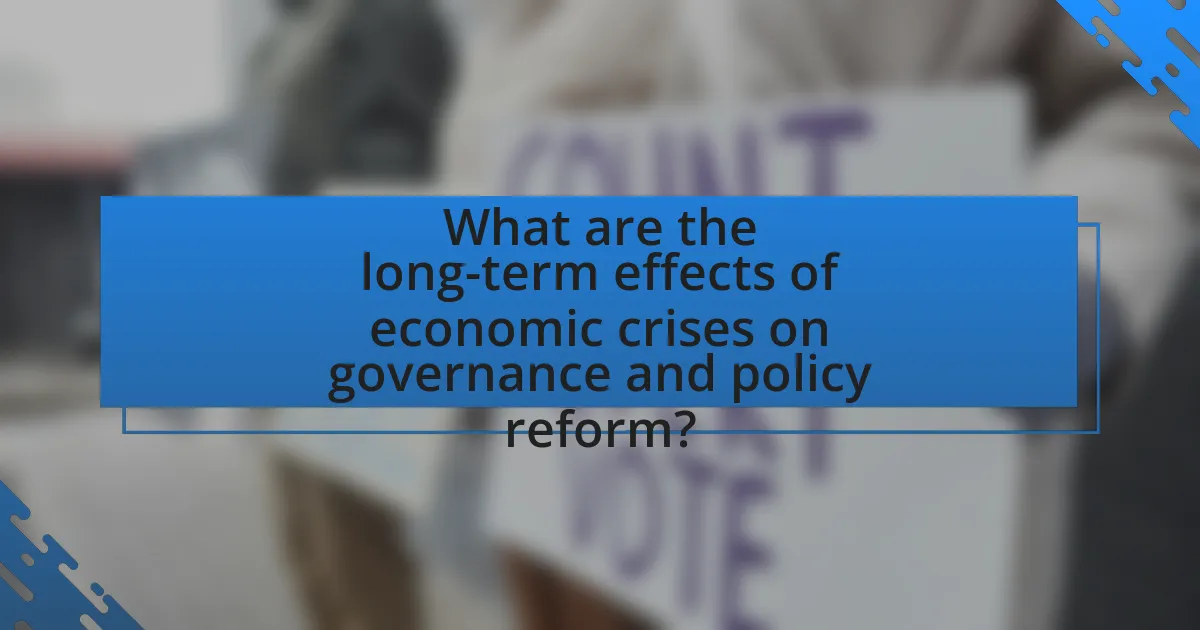
What are the long-term effects of economic crises on governance and policy reform?
Economic crises often lead to significant long-term effects on governance and policy reform, primarily by prompting shifts in political power and altering public policy priorities. For instance, economic downturns can result in increased public demand for accountability and transparency, leading to reforms aimed at enhancing governance structures. Historical examples include the 2008 financial crisis, which spurred regulatory reforms in the banking sector across various countries, such as the Dodd-Frank Act in the United States, aimed at preventing future crises. Additionally, economic crises can catalyze the rise of populist movements, which may challenge existing governance frameworks and push for radical policy changes. Research indicates that countries experiencing severe economic distress often see a reconfiguration of political alliances and an increased focus on social welfare policies, as governments seek to address public discontent and restore stability.
How do economic crises reshape institutional frameworks?
Economic crises reshape institutional frameworks by prompting significant reforms in governance and policy to address systemic weaknesses. For instance, during the 2008 financial crisis, many countries implemented regulatory changes to enhance financial oversight, such as the Dodd-Frank Act in the United States, which aimed to prevent future economic collapses by increasing transparency and accountability in financial institutions. Additionally, economic downturns often lead to shifts in political power, as citizens demand more effective governance, resulting in the establishment of new institutions or the reformation of existing ones to better respond to public needs. This dynamic is evidenced by the rise of populist movements in various countries following economic hardships, which have led to changes in policy priorities and institutional structures.
What are the consequences of weakened institutions post-crisis?
Weakened institutions post-crisis lead to increased corruption, diminished public trust, and ineffective governance. When institutions are compromised, the rule of law often deteriorates, resulting in a lack of accountability and transparency. For example, the 2008 financial crisis saw a significant decline in regulatory oversight, which contributed to widespread corruption and financial mismanagement. Additionally, weakened institutions can hinder economic recovery by failing to implement necessary reforms, as seen in countries like Greece, where institutional fragility delayed recovery efforts and exacerbated social unrest.
How do crises influence the development of new governance models?
Crises significantly influence the development of new governance models by creating urgent demands for adaptive and innovative responses to complex challenges. Historical examples, such as the 2008 financial crisis, prompted governments to implement regulatory reforms and establish new oversight bodies, like the Financial Stability Oversight Council in the United States, to prevent future economic collapses. Additionally, crises often expose existing governance failures, leading to the adoption of more participatory and transparent models, as seen in the aftermath of the Arab Spring, where citizens demanded greater accountability and inclusiveness in governance. These shifts are driven by the necessity to restore public trust and ensure resilience against future shocks, thereby reshaping the governance landscape.
What strategies can be employed to ensure effective policy reform after a crisis?
Effective policy reform after a crisis can be ensured through strategies such as stakeholder engagement, evidence-based decision-making, and adaptive governance. Stakeholder engagement involves actively involving affected communities and experts in the reform process, which fosters trust and increases the likelihood of successful implementation. Evidence-based decision-making relies on data and research to inform policies, ensuring that reforms address the actual needs and conditions resulting from the crisis. Adaptive governance allows for flexibility in policy implementation, enabling adjustments based on real-time feedback and changing circumstances. Historical examples, such as the post-2008 financial crisis reforms in various countries, demonstrate that these strategies can lead to more resilient and effective governance outcomes.
What best practices can governments adopt for resilient governance?
Governments can adopt best practices for resilient governance by implementing transparent decision-making processes, fostering public participation, and enhancing adaptive capacity. Transparent decision-making builds trust and accountability, as seen in countries like New Zealand, which has consistently ranked high in transparency indices. Public participation ensures that diverse perspectives are considered, leading to more effective policies; for example, participatory budgeting in Brazil has empowered communities and improved resource allocation. Enhancing adaptive capacity involves investing in data-driven policy frameworks and scenario planning, which has been effective in countries like Singapore, allowing them to respond swiftly to economic shocks. These practices collectively strengthen governance resilience in the face of economic crises.
How can stakeholder engagement improve policy outcomes post-crisis?
Stakeholder engagement can significantly improve policy outcomes post-crisis by fostering collaboration, enhancing transparency, and ensuring that diverse perspectives are considered in decision-making. Engaging stakeholders, such as community members, businesses, and non-profit organizations, allows policymakers to gather valuable insights and feedback that reflect the needs and priorities of the affected population. For instance, research conducted by the World Bank indicates that inclusive policy-making processes lead to more effective and sustainable outcomes, as they build trust and legitimacy among stakeholders. This collaborative approach not only helps in identifying practical solutions but also increases the likelihood of successful implementation, as stakeholders are more likely to support policies they helped shape.
